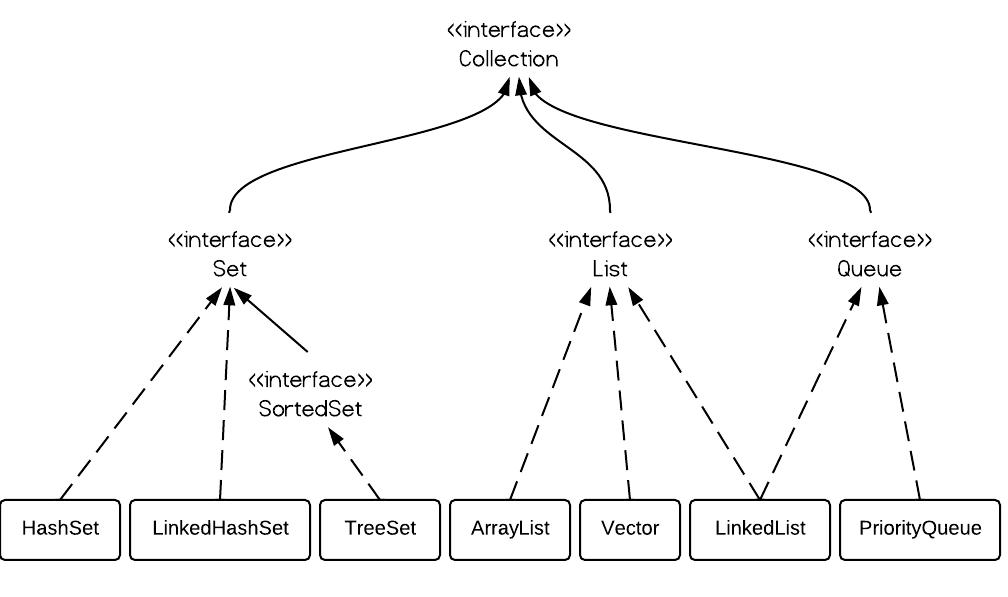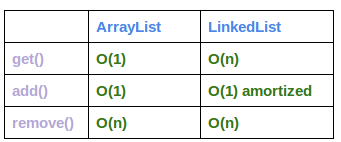1. List Overview
List is an ordered sequence of elements. Whereas, Set is a set of elements which is unordered and every element is unique.

2. ArrayList vs. LinkedList vs. Vector
Vector:
- similar as ArrayList, but is synchronized
- doubles array size when more space is required to add more elements
- better choice than ArrayList when program is non-thread-safe
ArrayList:
- resizable array. As more elements are added to ArrayList, its size is increased dynamically
- elements can be accessed directly by using the get and set methods as it is an array
- grow 50% of its size when more space is required to add more elements
- default initial capacity is pretty small, so it is a good habit to construct the ArrayList with a higher initial capacity to avoid the resizing cost
- better choice than Vector when program is thread-safe
LinkedList:
- double linked list
- Performance on add and remove is better than ArrayList, but worse on get and set methods
- implements Queue interface which adds more methods than ArrayList and Vector, such as offer(), peek(), poll(), etc
3. ArrayList Example
ArrayList al = new ArrayList();
al.add(3);
al.add(2);
al.add(1);
al.add(4);
al.add(5);
al.add(6);
al.add(6);
Iterator iter1 = al.iterator();
while(iter1.hasNext()){
System.out.println(iter1.next());
}
4. LinkedList Example
LinkedList ll = new LinkedList();
ll.add(3);
ll.add(2);
ll.add(1);
ll.add(4);
ll.add(5);
ll.add(6);
ll.add(6);
Iterator iter2 = al.iterator();
while(iter2.hasNext()){
System.out.println(iter2.next());
}
As shown in the examples above, they are similar to use. The real difference is their underlying implementation and their operation complexity.
5. Vector Example
Vector is almost identical to ArrayList, and the difference is that Vector is synchronized. Because of this, it has an overhead than ArrayList. Normally, most Java programmers use ArrayList instead of Vector because they can synchronize explicitly by themselves.
6. Performance of ArrayList vs. LinkedList
The time complexity comparison is as follows:

ArrayList arrayList = new ArrayList();
LinkedList linkedList = new LinkedList();
// ArrayList add
long startTime = System.nanoTime();
for (int i = 0; i < 100000; i++) {
arrayList.add(i);
}
long endTime = System.nanoTime();
long duration = endTime - startTime;
System.out.println("ArrayList add: " + duration);
// LinkedList add
startTime = System.nanoTime();
for (int i = 0; i < 100000; i++) {
linkedList.add(i);
}
endTime = System.nanoTime();
duration = endTime - startTime;
System.out.println("LinkedList add: " + duration);
// ArrayList get
startTime = System.nanoTime();
for (int i = 0; i < 10000; i++) {
arrayList.get(i);
}
endTime = System.nanoTime();
duration = endTime - startTime;
System.out.println("ArrayList get: " + duration);
// LinkedList get
startTime = System.nanoTime();
for (int i = 0; i < 10000; i++) {
linkedList.get(i);
}
endTime = System.nanoTime();
duration = endTime - startTime;
System.out.println("LinkedList get: " + duration);
// ArrayList remove
startTime = System.nanoTime();
for (int i = 9999; i >=0; i--) {
arrayList.remove(i);
}
endTime = System.nanoTime();
duration = endTime - startTime;
System.out.println("ArrayList remove: " + duration);
// LinkedList remove
startTime = System.nanoTime();
for (int i = 9999; i >=0; i--) {
linkedList.remove(i);
}
endTime = System.nanoTime();
duration = endTime - startTime;
System.out.println("LinkedList remove: " + duration);
And the output is:
ArrayList add: 13265642
LinkedList add: 9550057
ArrayList get: 1543352
LinkedList get: 85085551
ArrayList remove: 199961301
LinkedList remove: 85768810
LinkedList is faster in add and remove, but slower in get. In brief, LinkedList should be preferred if:
- there are no large number of random access of element
- there are a large number of add/remove operations
-
Previous
Spring ContextLoader and DispatcherServlet Concepts -
Next
How LinkedHashSet Works Internally